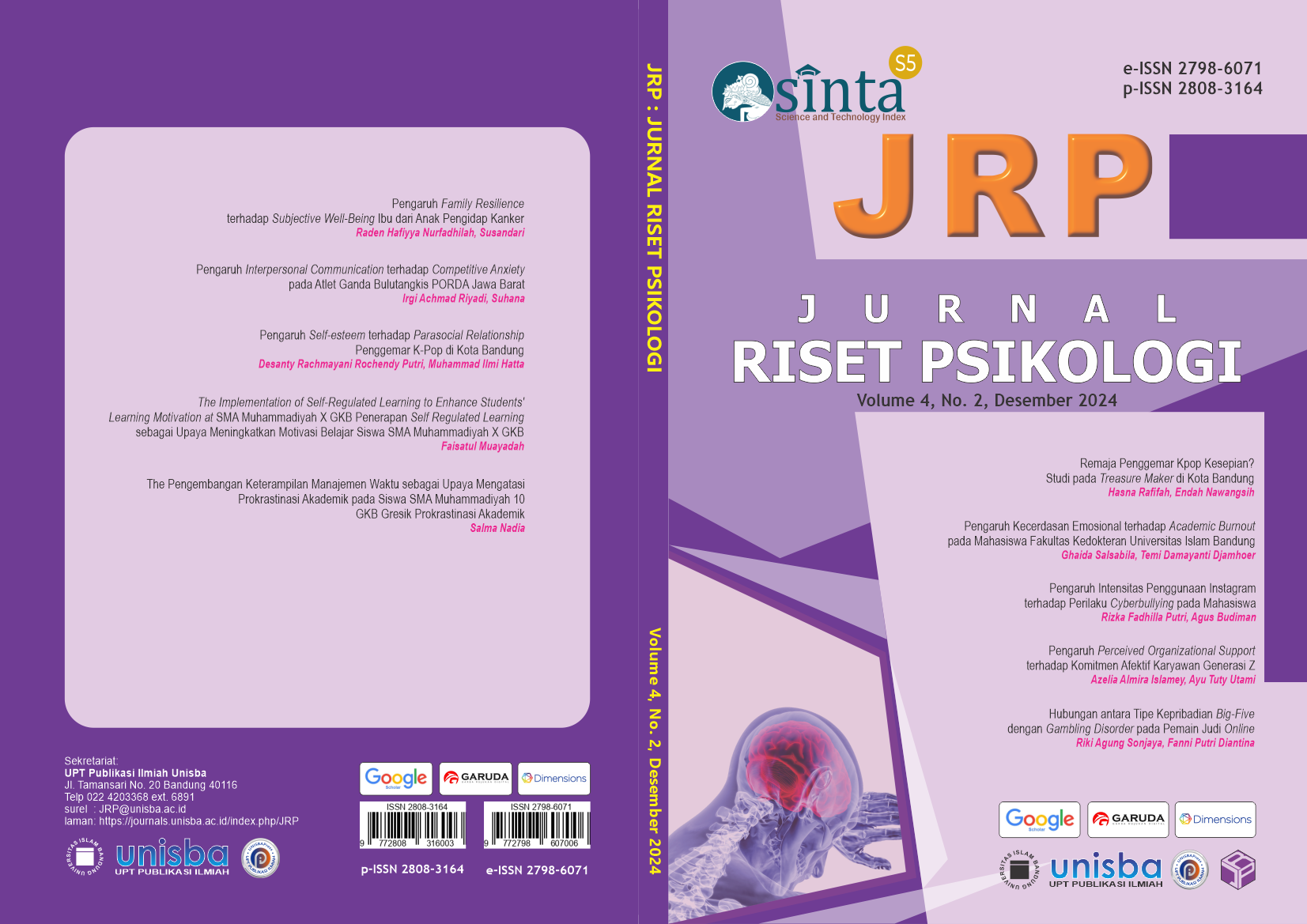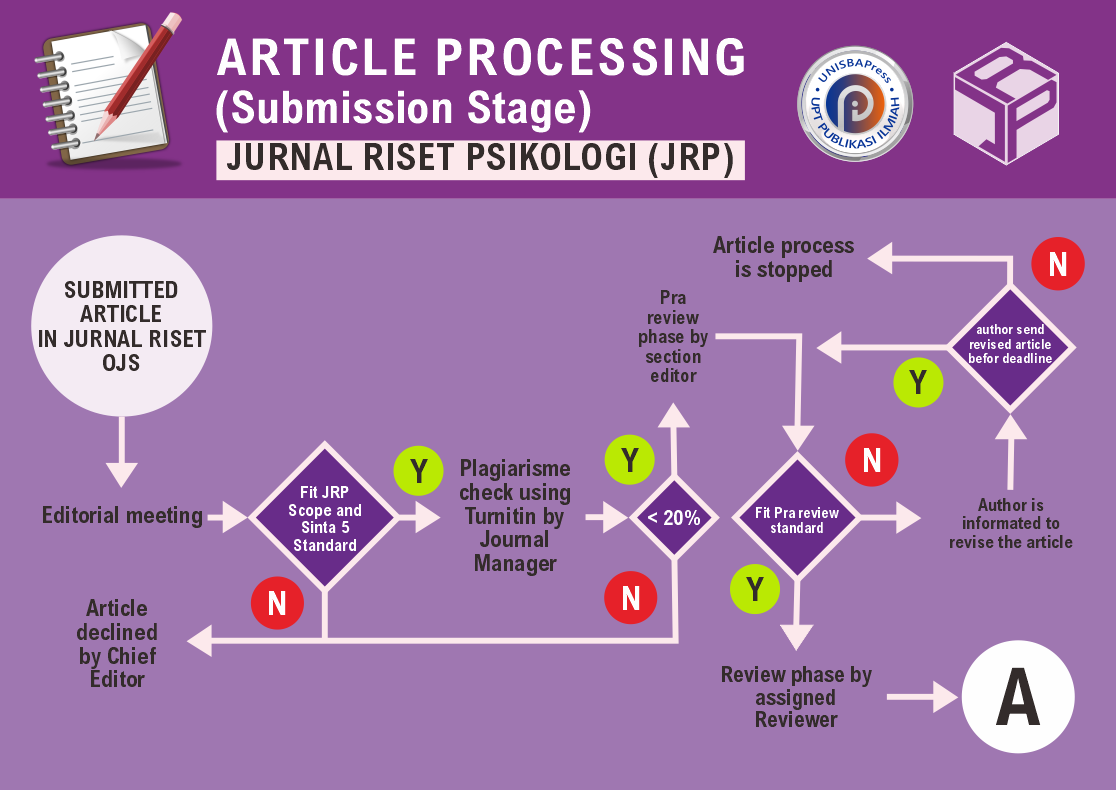Pengaruh Family Resilience terhadap Subjective Well-Being Ibu dari Anak Pengidap Kanker
DOI:
https://doi.org/10.29313/jrp.v4i2.5228Keywords:
Family Resilience, Subjective Well-Being, Mothers of Children with CancerAbstract
Abstract. The purpose of this study was to determine how family resilience affects subjective well-being in mothers of children with cancer. Walsh (2006) explains family resilience is a process of coping and adaptation in the family as a functional unit. According to Diener (2002) Subjective well-being is an individual's subjective evaluation, including life satisfaction and feelings they feel. The subjects of this study were 50 mothers of children with cancer who lived temporarily in a halfway house. The hypothesis of this study is that family resilience has a significant effect on the subjective well-being of mothers of children with cancer. The method used is quantitative with simple regression analysis. The measuring instrument used is the Family Resilience Assessment Scale (FRAS) developed by Sixbey (2005) and then adapted into Indonesian by Iskandarsyah et al. (2014). The subjective well-being measuring instrument uses the Satisfaction With Life Scale (SWLS) by Diener (1985) which was adapted into Indonesian by Akhtar (2019) to measure the cognitive dimension and the Scale of Positive and Negative Experience (SPANE) by Diener (2010) which was adapted in Indonesian by Aryanto (2018). The regression results show that family resilience affects subjective well-being.
Abstrak. Tujuan penelitian ini untuk mengetahui bagaimana pengaruh family resilience terhadap subjective well-being pada ibu dari anak pengidap kanker. Walsh (2006) menjelaskan family resilience merupakan proses coping dan adaptasi dalam keluarga sebagai suatu unit yang fungsional. Menurut Diener (2002) Subjective well-being adalah evaluasi subyektif individu, termasuk kepuasan hidup dan perasaan yang dirasakannya. Subjek penelitian ini adalah 50 ibu dari anak pengidap kanker yang tinggal sementara di rumah singgah. Hipotesis penelitian ini adalah family resilience berpengaruh secara signifikan terhadap subjective well-being ibu dari anak pengidap kanker. Metode yang digunakan adalah kuantitatif dengan analisis regresi sederhana. Alat ukur yang digunakan adalah Family Resilience Assessment Scale (FRAS) yang dikembangkan oleh Sixbey (2005) lalu diadaptasi ke dalam Bahasa Indonesia oleh Iskandarsyah et al. (2014). Alat ukur subjective well-being menggunakan Satisfaction With Life Scale (SWLS) oleh Diener (1985) yang diadaptasi ke dalam Bahasa Indonesia oleh Akhtar (2019) untuk mengukur dimensi kognitif dan Scale of Positive and Negatif Experience (SPANE) oleh Diener (2010) yang diadaptasi dalam Bahasa Indonesia oleh Aryanto (2018). Hasil regresi menunjukan bahwa family resilience berpengaruh terhadap subjective well-being.
References
KEMENKES, “Kenali Gejala Dini Kanker Pada Anak,” P2PTM.
M. A. Kostak and G. Avci, “Hopelessness and Depression Levels of Parents of Children with Cancer,” Asian Pacific Journal of Cancer Prevention, vol. 14, no. 11, pp. 6833–6838, Nov. 2013, doi: 10.7314/APJCP.2013.14.11.6833.
S. K. Zahrani and F. Coralia, “Tingkat Ekspresi Emosi pada Caregiver Skizofrenia di Kecamatan Kersamanah, Kabupaten Garut,” Jurnal Riset Psikologi, vol. 1, no. 2, pp. 119–123, Feb. 2022, doi: 10.29313/jrp.v1i2.557.
L. Kristiani, H. Wirawan, R. C. Kusumarojo, and E. S. Tehuteru, “Gambaran Emosi Ibu dari Anak Penderita Kanker,” Indonesian Journal of Cancer, vol. 2, no. 2, Jul. 2008, doi: 10.33371/ijoc.v2i2.41.
Y. P. Pratiwi and F. Coralia, “Studi Mengenai Gambaran Subjective Well-Being pada Ibu Pekerja Selama Masa Pandemi Covid-19,” Jurnal Riset Psikologi, vol. 1, no. 2, pp. 140–146, Feb. 2022, doi: 10.29313/jrp.v1i2.560.
D. Y. Pertiwi and A. S. Maryatmi, “Gambaran Subjective Well-Being pada Ibu yang Memiliki Anak Thalasemia di Perumahan X,” IKRA-ITH HUMANIORA: Jurnal Sosial dan Humaniora, vol. 3, no. 1, 2019.
K. Reivich and A. Shatté, The resilience factor: 7 essential skills for overcoming life’s inevitable obstacles. Broadway Books, 2002.
M. D. A. Youhan, “Pengaruh Flow terhadap Subjective Well-Being pada Musisi Komunitas Musik KlabJazz,” Jurnal Riset Psikologi, vol. 3, no. 2, pp. 155–162, Dec. 2023, doi: 10.29313/jrp.v3i2.3297.
F. Walsh, “A Family Resilience Framework: Innovative Practice Applications,” Fam Relat, vol. 51, no. 2, pp. 130–137, Apr. 2002, doi: 10.1111/j.1741-3729.2002.00130.x.
F. Walsh, “Family Resilience: A Framework for Clinical Practice,” Fam Process, vol. 42, no. 1, pp. 1–18, 2003.
H. Pradjatmo, W. A. Nisman, and Y. Fatmawati, “Quality of life of cervical cancer patient with support from nuclear family and extended family in Dr. Sardjito general hospital, Yogyakarta Indonesia: a comparative study,” Int J Res Med Sci, vol. 5, no. 8, p. 3554, Jul. 2017, doi: 10.18203/2320-6012.ijrms20173561.
R. A. Cummins, N. Li, M. Wooden, and M. Stokes, “A Demonstration of Set-Points for Subjective Wellbeing,” J Happiness Stud, vol. 15, no. 1, pp. 183–206, Feb. 2014, doi: 10.1007/s10902-013-9444-9.
K. B. Kortte, M. Gilbert, P. Gorman, and S. T. Wegener, “Positive psychological variables in the prediction of life satisfaction after spinal cord injury.,” Rehabil Psychol, vol. 55, no. 1, pp. 40–47, Feb. 2010, doi: 10.1037/a0018624.
M. Palancı, “The Prediction of Family Resilience, Subjective Well-being and Marital Adjustment of Parents Who Has a Child with a Disability by Psychosocial Competencies,” TED EĞİTİM VE BİLİM, Apr. 2017, doi: 10.15390/EB.2017.4384.
H. M. W. Bos, N. Carone, E. D. Rothblum, A. S. Koh, and N. K. Gartrell, “Long-Term Effects of Family Resilience on the Subjective Well-Being of Offspring in the National Longitudinal Lesbian Family Study,” J. Environ. Res. Public Health, 2023.
M. McCubbin, K. Balling, P. Possin, S. Frierdich, and B. Bryne, “Family Resiliency in Childhood Cancer*,” Fam Relat, vol. 51, no. 2, pp. 103–111, Apr. 2002, doi: 10.1111/j.1741-3729.2002.00103.x.
N. Nazwirman, E. Zain, and N. Kholifah, “Pengaruh Dukungan Sosial Dan Work Family Conflict Terhadap Subjective Well-Being (Studi Pada Ibu Rumah Tangga Bekerja Dan Membuka Umkm Di Kampung Wisata Bisnis Bogor),” Optimal: Jurnal Ekonomi dan Kewirausahaan, vol. 12, no. 2, pp. 123–138, Jul. 2019, doi: 10.33558/optimal.v12i2.1685.













